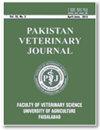求助PDF
{"title":"Spectrophotometric Calibration and Comparison of Different Semen Evaluation Methods in Nili-Ravi Buffalo Bulls","authors":"Saif-ur-Rehman, Laiba Shafique, M. Yousuf, Liu Qingyou, J. Ahmed, H. Riaz","doi":"10.29261/pakvetj/2019.073","DOIUrl":null,"url":null,"abstract":"Received: Revised: Accepted: Published online: November 28, 2018 March 28, 2019 April 01, 2019 May 20, 2019 This study was designed with the aim to find suitable spectrophotometric wavelength for accurate measurement of sperm concentration in Nili Ravi buffalo and to compare different quantitative methods (visual, hemocytometric and spectrophotometric) for the assessment of sperm concentration. A total of 78 fresh semen ejaculate were collected from breeding buffalo bulls, diluted with required concentrations and relationship between sperm number and absorbance was determined at 350, 450, 546 and 650 nm wavelengths by using spectrophotometer. The spectrometric results showed that λmax was obtained at 350 nm. The derived equation between sperm concentration counted by haemocytometer and absorbance at 350 nm was Y = 0.1135x + 0.0002 (R = 0.9924), at 450 nm, Y = 0.1011x-0.0436 (R = 0.9756), at 546nm, Y = 0.0825x-0.0101 (R = 0.9603) and at 650 nm, Y = 0.0774x-0.0235 (R = 0.9602). These results were later compared with relative sperm numbers at different dilutions. The results showed that 350nm wavelength appeared suitable for estimation of sperm concentration compared to others. Additionally, it was found that both photometer(P<0.01) and haemocytometer (P<0.01) significantly counted more sperm cells than visual assessment as used regularly on different SPUs. Moreover, haemocytometer counted significantly (834×10Vs 678×10, P=0.005) more sperm cell than Photometer. Finally, regression analysis between haemocytometer and Photometer showed significant slope of regression and regression coefficient was 0.771 which warns that photometer must be calibrated before proper employment for routine measurement of sperm concentration. ©2019 PVJ. All rights reserved","PeriodicalId":19845,"journal":{"name":"Pakistan Veterinary Journal","volume":" ","pages":""},"PeriodicalIF":5.4000,"publicationDate":"2019-10-01","publicationTypes":"Journal Article","fieldsOfStudy":null,"isOpenAccess":false,"openAccessPdf":"","citationCount":"13","resultStr":null,"platform":"Semanticscholar","paperid":null,"PeriodicalName":"Pakistan Veterinary Journal","FirstCategoryId":"97","ListUrlMain":"https://doi.org/10.29261/pakvetj/2019.073","RegionNum":3,"RegionCategory":"农林科学","ArticlePicture":[],"TitleCN":null,"AbstractTextCN":null,"PMCID":null,"EPubDate":"","PubModel":"","JCR":"Q1","JCRName":"VETERINARY SCIENCES","Score":null,"Total":0}
引用次数: 13
引用
批量引用
Nili Ravi水牛不同精液评价方法的分光光度法校准及比较
本研究旨在寻找合适的分光光度波长,以准确测量尼利拉维水牛的精子浓度,并比较不同的定量方法(目测法、血细胞法和分光光度法)对精子浓度的评估。采用分光光度计,在350、450、546和650 nm波长下,采集了78只纯种水牛的新鲜射精,用所需浓度稀释,测定了精子数量与吸光度的关系。光谱分析结果表明,在350 nm处获得λmax。在350 nm处,Y = 0.1135x + 0.0002 (R = 0.9924),在450 nm处,Y = 0.1011x-0.0436 (R = 0.9756),在546nm处,Y = 0.0825x-0.0101 (R = 0.9603),在650 nm处,Y = 0.0774x-0.0235 (R = 0.9602)。这些结果随后与不同稀释度下的相对精子数量进行了比较。结果表明,与其他波长相比,350nm波长更适合用于估计精子浓度。此外,光度计(P<0.01)和血细胞计(P<0.01)在不同spu上使用的精子计数明显多于目测。此外,血细胞计的精子计数明显多于光度计(834×10Vs 678×10, P=0.005)。最后,血球计与光度计的回归分析显示回归斜率显著,回归系数为0.771,提示光度计在正常用于精子浓度的常规测量之前必须进行校准。©2019 PVJ。版权所有
本文章由计算机程序翻译,如有差异,请以英文原文为准。


